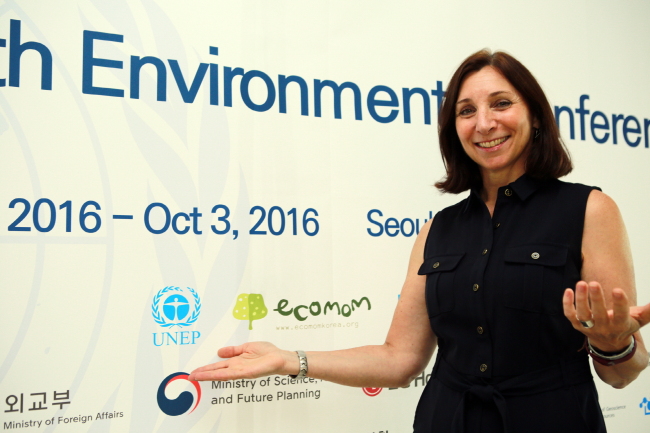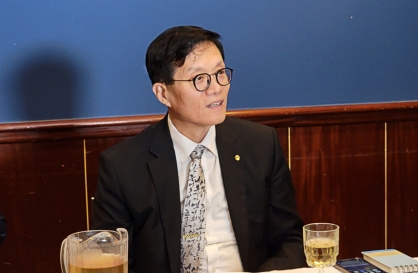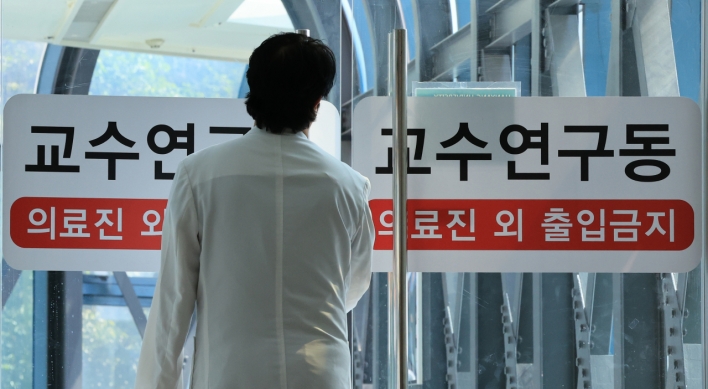After 14 years of working at the United Nations Environment Program, Monika Macdevette believes today’s youth hold the key to the future of both the Earth and humankind.
Environmental problems will only get worse, more diverse and complicated, as long as civilization continues to develop along its current path.
That’s why youths need to “bring inquisitiveness to ask questions why these problems are happening, where they come from and force answers,” the UNEP deputy director of environmental policy implementation said.
Environmental problems will only get worse, more diverse and complicated, as long as civilization continues to develop along its current path.
That’s why youths need to “bring inquisitiveness to ask questions why these problems are happening, where they come from and force answers,” the UNEP deputy director of environmental policy implementation said.

Even now, “there are a lot of different kinds of pollution that we don’t even consider to be pollution, like light pollution,” Macdevette told The Korea Herald in a recent interview. “Such pollution could lead to detrimental health effects.”
Originally an environmental physiologist, the Nairobi-based officer was in Seoul last week to attend the UN Youth Conference on Environment, which wrapped up on Oct. 3 its four-day program mainly focused on recycling.
Supported by Korea’s Environment Ministry and hosted by UNEP and World Federation of United Nations Associations, the event was first held in Seoul last year with the theme of water and sustainable development.
“Now is the time when youths are implementing and achieving sustainable development goals,” Macdevette said.
“It will become their world, their environment and their paradigm where they will grow up and live in.”
There will be, and should be, more avenues and entry points for young people to take part in environment-related events and programs. But to bring about a more fundamental change, our education system must change, Macdevette continued.
“Education is a huge opportunity to influence one’s life from the early stage, so in my view, environment has to be in the education curriculum from the beginning.”
She stressed that the education must incorporate the understanding of environmental connectedness, the relation between the Earth and mankind, as well as how we can be more eco-friendly in our daily life.
Many of the environmental issues come down to the question of how we, as consumers, use and throw away products, Macdevette said.
“Production and consumption patterns are extremely important,” she said, adding that consumers can help bring about a swift route to a cleaner and greener economy, by using products more efficiently and disposing of them more responsibly.
“The way we throw away things, whether we have used it or not, is important because it can end up being trash or otherwise. It could be a good resource for recycling,” she added.
By Kim Da-sol (ddd@heraldcorp.com)
Originally an environmental physiologist, the Nairobi-based officer was in Seoul last week to attend the UN Youth Conference on Environment, which wrapped up on Oct. 3 its four-day program mainly focused on recycling.
Supported by Korea’s Environment Ministry and hosted by UNEP and World Federation of United Nations Associations, the event was first held in Seoul last year with the theme of water and sustainable development.
“Now is the time when youths are implementing and achieving sustainable development goals,” Macdevette said.
“It will become their world, their environment and their paradigm where they will grow up and live in.”
There will be, and should be, more avenues and entry points for young people to take part in environment-related events and programs. But to bring about a more fundamental change, our education system must change, Macdevette continued.
“Education is a huge opportunity to influence one’s life from the early stage, so in my view, environment has to be in the education curriculum from the beginning.”
She stressed that the education must incorporate the understanding of environmental connectedness, the relation between the Earth and mankind, as well as how we can be more eco-friendly in our daily life.
Many of the environmental issues come down to the question of how we, as consumers, use and throw away products, Macdevette said.
“Production and consumption patterns are extremely important,” she said, adding that consumers can help bring about a swift route to a cleaner and greener economy, by using products more efficiently and disposing of them more responsibly.
“The way we throw away things, whether we have used it or not, is important because it can end up being trash or otherwise. It could be a good resource for recycling,” she added.
By Kim Da-sol (ddd@heraldcorp.com)



![[AtoZ into Korean mind] Humor in Korea: Navigating the line between what's funny and not](http://res.heraldm.com/phpwas/restmb_idxmake.php?idx=644&simg=/content/image/2024/04/22/20240422050642_0.jpg&u=)





![[Herald Interview] Why Toss invited hackers to penetrate its system](http://res.heraldm.com/phpwas/restmb_idxmake.php?idx=644&simg=/content/image/2024/04/22/20240422050569_0.jpg&u=20240422150649)








![[Herald Review] Xdinary Heroes kicks off five-month-long project with solo concert, teases new album](http://res.heraldm.com/phpwas/restmb_idxmake.php?idx=652&simg=/content/image/2024/04/22/20240422050539_0.jpg&u=20240422152154)
![[Today’s K-pop] Illit logs 100m Spotify streams with debut song](http://res.heraldm.com/phpwas/restmb_idxmake.php?idx=642&simg=/content/image/2024/04/22/20240422050650_0.jpg&u=)